Physics-Based Observable Motorcycle Trials
Trials by Red Lynx has to be the single most masochistic gaming experience of my young life. The game is hard. And not just hard, super superlative descriptor hard. It’s certainly entertaining, but its long-lasting enjoyment will be a direct correlation of how stubborn you are as a player. Allow me to explain.
Trials is a physics game that mimics the actual event of Motorcycle Observed Trials. Observed Trials isn’t racing. Instead, it’s a test of concentration, balance, and rider skill to overcome obstacles in a defined section of course. Trials does a good job of capturing this aesthetic. You need to slow down, think, and approach sections of the course with a more strategic mindset than you would in actual racing games. Maxing out the throttle and going as fast as you can is a sure-fire recipe for disaster.
Trials is the first of a series, but I’m talking about it first because it’s the easiest. The most recent Trials game, Trials: Mountain Heights, would be nightmarishly difficult to a first-time Trials player. The designers at Red Lynx became very keen at understanding why a section is difficult, and they really take difficulty to a bold new era of frustration with Mountain Heights.
The player controls are immediately simple: up and down control throttle, and left and right control rider position and induce rotation. Your rider will change positions from squatting back to leaning forward as you move left to right. Different positions work well in different situations. For instance, you’ll need to lean all the way forward when you climb steep hills. Throwing your weight forward from a rearward position is required to clear some obstacles, too.
The scoring in Trials is subtractive. That is, a score of zero is a perfect score. A crash is worth 5 points and there are several time penalties if you take longer than one minute. While the game does have the time pressure of a two-minute cutoff, that’s more than enough time to finish a section after you get used to the controls.
As with most great physics games, though, the real control exists one level abstracted from the input. Careful management of your rider’s stance is required to avoid losing control of the bike and flipping over. There is a lot of nuance required to master the game. Stable landings and climbing over ruts are much more difficult than they may appear to an observer.
The physics in Trials are spring-based. The bike and rider appear to be contraptions composed of several springs. Your rider’s position is changed by modifying the lengths of these springs. While it’s great to have a unified system like this to describe both the bike and rider, it does feel a little spongy at times. There’s a lot of dampening that can negatively affect your wheels’ traction. It is possible to collapse the springs of the bike with a hard impact, too, which can be annoying, especially when it happens on an otherwise flawless landing.
After playing the later games in the sequel, Trials is actually easy for me now, which is somewhat alarming. I can pass all of the levels with a perfect zero and barely break a sweat, which is stark contrast to the leg-punching frustrating I felt when I first played the game. Personally I find games like this fascinating–I can’t help but play it over and over again until I can perfect my ability.
Trials is one of the great physics games and a neat implementation of a unique sport. It’s a good game to play in short time segments and the perfect challenge for physics game lovers. Can you get a perfect score?
Play free online (Java) or buy full version ($14.95) over at Miniclip.com.
Related Posts:
- Trials HD Headed to Xbox 360
- The Beginning
- Trials 2SE Visual Upgrade, Same Great Physics
- Hot Biscuit Flash Motorcycle Trials
- About
The Pinnacle of Breakout Games: BreakQuest
If you were trapped on an island and had to pick one Breakout game to keep you company, BreakQuest by Nurium Games would be it. It is, far and away, the best Breakout clone to ever hit the market. Sounds like hyperbole? Maybe, but give the game a few minutes of your time before you come to your own conclusions.
BreakQuest is a Breakout game that makes heavy use of physics. The core Breakout concept remains. You control horizontal movement of a paddle at the bottom of the screen. Any game player is familiar with the concept, but where BreakQuest extends the game is gratuitous and inventive use of physics. Instead of stationary blocks, many of the levels have physics gizmos and doodads to hit around. Everything can bounce off everything else which makes for some chaotic gameplay.
BreakQuest features 100 levels, and each one really is unique. While most Breakout games simply utilize different arrangements of the same objects, Nurium really went the extra mile by customizing each level with its own visuals, aural themes, and style. Some levels do have similar styles of play, but for the most part each level truly is completely original from all the others. It’s an amazing amount of content in a Breakout title.
It’s worth mentioning that the game’s audio is very well done. The music is by the well-known Maniacs of Noise, but what really stands out is the interactive audio. Most of the objects in the game have different tones when they are struck, which results in a very synesthetic style of play. The video above is a great example of this.
The physics in BreakQuest utilize the DynaMo library. While this library doesn’t provide collision detection, it does do an excellent job of managing things like forces, torques, and constraints. The physics just feel right. Absolutely everything in BreakQuest interacts with everything else which adds tremendously to the game’s replay value.
BreakQuest introduces a mechanism to solve the “last block” problem in Breakout games. Right-clicking will apply a gravitational force to all balls in play that will arc their trajectory downwards. With a little practice, you can use this to steer your balls with some degree of precision. It makes hitting that last nagging little block much easier. This little feature really adds to the sense of mastery in learning the game.
BreakQuest sits at the standard $19.99 downloadable game price point. Really, I think it could be priced higher given the sheer volume of content it brings to the play experience. Even more impressive is that everything except the audio was done by one man: Fèlix Casablancas. He’s working on a puzzle game aimed at the casual market now, which I’m very much looking forward to.
If you’ve burnt out on brick-breaking clones and need something to freshen the genre for you check BreakQuest out today. Its use of physics completely revitalizes the entire concept of Breakout games.
Related Posts:
Nuts About Physics: Switchball
Switchball is a new game by Atomic Elbow, creators of the IGF-nominated Crazyball. They bill it as a sequel (although Crazyball was never finished?) and describe it as:
Steer the Switchball past traps and puzzles in 20 increasingly challenging levels by morphing between balls with different properties and abilities. Use machines and elements like magnets, fans, cannons, fire, water and many more in a game that gives you the fun of oldschool platform gaming with ultra realistic physics and awesome 3D graphics!
The game falls into the roll-the-ball-to-the-goal genre with as many inventive physics contraptions as possible to get in your way. Switchball utilizes the Ageia physics engine, which means there are a lot of possibilities for innovative obstacles. Atomic Elbow promises 4 levels that will be exclusive to owners of the upcoming PhysX hardware, which is interesting. I’ve actually heard that Ageia licenses its technology for free to small developers who will support their hardware.
Gameplay in Switchball is a mix between skill-based maneuvering and thinking-based puzzles. Various pods throughout the level will change your ball’s physical attributes: to a super-heavy metal ball, lightweight ball, or electric ball and so on (as far as I know Ballance was the first game to use this material-changing theme). Getting through a level requires you change materials as needed to get by obstacles. A metal ball is too heavy to cross a wooden plank, for instance, but burly enough to push the preceding crates out of the way. Alternating materials several times is usually required to get by an area.
This review is based on a free 1-level alpha demo of Switchball that Atomic Elbow recently released. They warn that this isn’t indicative of the final quality of the game, but as far as I can tell everything is top-notch. The graphics and audio are both excellent. My one complaint is that the camera feels a little weak. I’m often manually controlling its orientation and zoom level to see where I need to go which can be annoying. Of course, in a game like this the camera is everything and it’s certainly a difficult development challenge. If they can polish up the camera movement Switchball will indeed be a very excellent game when it’s done.
The game is available for download here or over at Atomic Elbow’s site. They are actively soliciting feedback for this release, so if you check it out and have some suggestions feel free to let them know.
Atomic Elbow’s Crazyball was nominated in the Independent Games Festival 2006 for the Technical Excellence award. They’ve kicked their craft up a notch since then with Switchball. Check out the free download of this great physics game!
Download the game here (43.2 MB).
Related Posts:
- Switchball Released
- Excellent Marble Madness-Inspired Physics Game
- List of Physics Games
- Interview with Matthew Wegner (Fun-Motion.com)



 (Rate this game! 98 votes, average: 3.70 out of 5)
(Rate this game! 98 votes, average: 3.70 out of 5)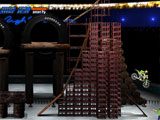
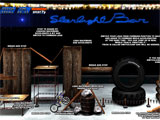
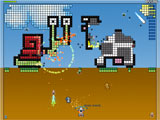
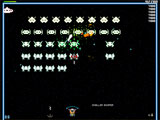
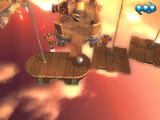
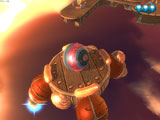
 My name is Matthew Wegner, and this site is dedicated to physics games.
My name is Matthew Wegner, and this site is dedicated to physics games.